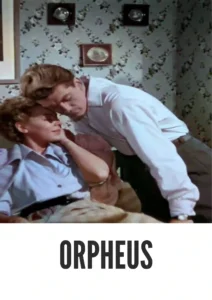Video Sources 0 Views
- Watch trailer
- Orpheus 1950 Colorized


Synopsis
Table of Contents
Toggle
Step into the enchanting world of Orpheus, a surreal fantasy drama from 1950, now beautifully colorized to enhance your viewing experience. Directed by the visionary Jean Cocteau, this film reimagines the classic Greek myth of Orpheus and Eurydice, blending elements of fantasy, romance, and existential reflection. This HD download offers a fresh perspective on a timeless tale, making it a must-see for fans of innovative cinema and those curious about Cocteau’s unique artistic vision.
Orpheus follows the story of Orpheus (Jean Marais), a renowned poet who becomes obsessed with the mysterious figure of Death (Maria Casares). When his beloved wife Eurydice (Marie Déa) dies tragically, Orpheus is consumed by grief and desperation. In his quest to reclaim her from the underworld, he encounters a series of surreal and dreamlike challenges that blur the lines between reality and mythology.As Orpheus navigates this mystical realm, he confronts themes of love, art, and the nature of existence. The film culminates in a poignant exploration of sacrifice and the power of love, showcasing Cocteau’s ability to weave profound philosophical questions into a visually stunning narrative. With its striking imagery and haunting score, Orpheus remains a powerful exploration of human emotion and artistic expression.
The film features an exceptional cast that breathes life into this mythological tale:
- Jean Marais as Orpheus
- Maria Casares as Death
- Marie Déa as Eurydice
- François Périer as Heurtebise
- Juliette Gréco as The Princess
Orpheus is categorized as a surreal fantasy drama, characterized by its dreamlike visuals and deep philosophical undertones. Cocteau’s masterful direction transforms this classic myth into an exploration of love, loss, and the creative process.
Released in 1950, Orpheus represents a significant moment in Jean Cocteau’s illustrious career. Known for his avant-garde approach to storytelling, Cocteau blends elements of poetry, theater, and visual art to create a unique cinematic experience. The film was produced during a time when European cinema was undergoing significant transformation, embracing new artistic movements that challenged traditional narrative structures.While Orpheus may not be as widely recognized as some mainstream films from its era, it stands out for its innovative use of symbolism and visual storytelling. The film is often regarded as a masterpiece of French cinema and continues to influence filmmakers and artists today.
This colorized version of Orpheus has been meticulously restored using advanced digital techniques that enhance its visual appeal while preserving the film’s original atmosphere. The colorization process involved analyzing the grayscale tones of the original footage and applying appropriate colors to each scene. This careful attention to detail breathes new life into Cocteau’s mesmerizing visuals, making it more accessible for modern audiences. While opinions on colorization vary among cinephiles, this process allows classic films like Orpheus to reach new viewers while maintaining their artistic integrity.
- : Jean Cocteau
- : Jean Cocteau
- : The myth of Orpheus
- : Henri Alekan
- : Colette Besson
- : Les Films du Carrosse
- : Argos Films
- : 95 minutes
- : MP4
- : HD (1080p)
- : Compatible with most devices, including smartphones, tablets, computers, and smart TVs.
Orpheus (1950) is often hailed as one of Cocteau’s finest works, showcasing his ability to merge visual artistry with profound thematic exploration. Critics have praised its innovative storytelling techniques and striking imagery. While it may not have achieved blockbuster status upon its release, it has since gained recognition as a seminal work in French cinema. The film continues to captivate audiences with its blend of fantasy and existential inquiry.
- : What is Orpheus about?
- A: Orpheus is a surreal fantasy drama about a poet who ventures into the underworld to reclaim his deceased wife.
- : Is Orpheus (1950) well-known?
- A: Yes, it is considered one of Jean Cocteau’s masterpieces and an important work in French cinema.
- : Is this version colorized?
- A: Yes, this version has been professionally colorized to enhance the viewing experience.
- : What makes Orpheus interesting for film enthusiasts?
- A: It offers insights into mythological themes while showcasing Cocteau’s unique artistic style.
- : What is the download format?
- A: The download format is MP4, compatible with most devices.
- : What resolution is available for download?
- A: The resolution is HD (1080p), providing a high-quality viewing experience.
Watch Orpheus Today!












